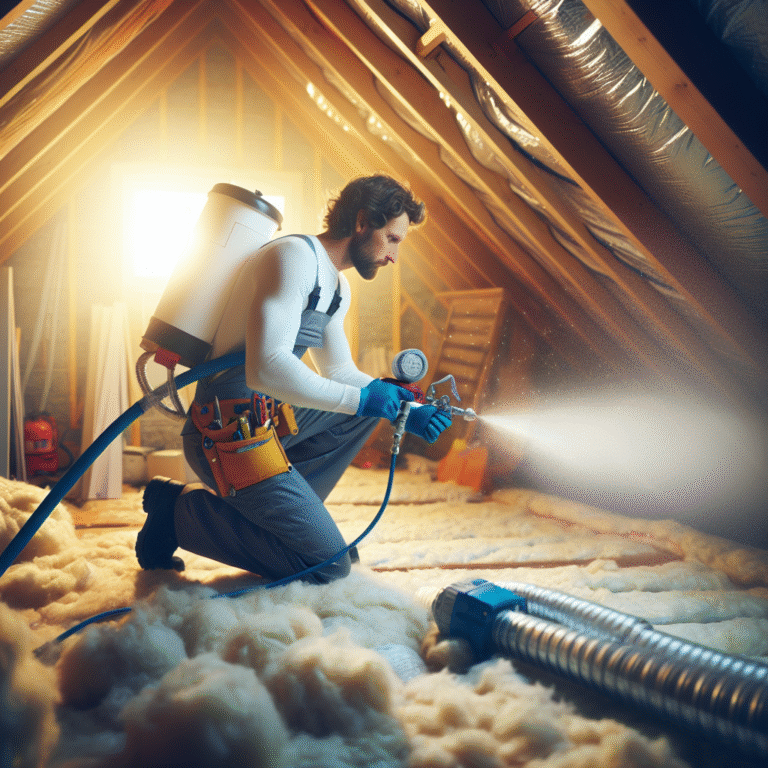-
Table of Contents
“Seal out moisture and keep your space comfortable with spray foam insulation.”
“Protect your home from humidity with spray foam insulation. Visit texasinsulationsolution.com to learn more and schedule your installation today.”
Introduction
Spray foam insulation is a popular choice for homeowners and builders looking to protect their homes against humidity. This type of insulation is known for its ability to create an airtight seal, preventing moisture from entering and causing damage. In this introduction, we will explore how spray foam insulation works to protect against humidity and the benefits it offers for maintaining a comfortable and healthy indoor environment.
Benefits of Using Spray Foam Insulation for Humidity Control
Humidity is a common problem that many homeowners face, especially in areas with high levels of moisture in the air. Excessive humidity can lead to a variety of issues, such as mold growth, musty odors, and even damage to the structure of a home. This is why it is crucial to have proper insulation in your home to protect against humidity. While there are various types of insulation available, spray foam insulation has proven to be one of the most effective in controlling humidity levels. In this article, we will explore the benefits of using spray foam insulation for humidity control.
First and foremost, spray foam insulation is known for its superior air sealing properties. Unlike traditional insulation materials, such as fiberglass or cellulose, spray foam insulation expands and fills every nook and cranny, creating an airtight seal. This means that there are no gaps or cracks for moisture to seep through, making it an excellent choice for humidity control. By preventing the entry of outside air, spray foam insulation helps to maintain a consistent indoor humidity level, reducing the risk of mold growth and other moisture-related issues.
Moreover, spray foam insulation has a high R-value, which is a measure of its thermal resistance. This means that it is an excellent insulator, keeping the warm air inside during the winter and the cool air inside during the summer. This is particularly beneficial for humidity control as it helps to maintain a stable temperature inside the home. When the temperature is consistent, the air can hold a specific amount of moisture, preventing condensation from forming on surfaces. Condensation is a significant contributor to high humidity levels, and by reducing it, spray foam insulation helps to keep the humidity in check.
Another advantage of spray foam insulation is its ability to resist water absorption. Traditional insulation materials, such as fiberglass, can absorb water, leading to mold growth and other moisture-related issues. On the other hand, spray foam insulation is made of a closed-cell structure, which means that it does not absorb water. This makes it an ideal choice for areas with high humidity levels, such as basements and crawl spaces. By preventing water absorption, spray foam insulation helps to keep the humidity levels low, protecting your home from potential damage.
Furthermore, spray foam insulation is a durable and long-lasting solution for humidity control. Unlike traditional insulation materials that can sag or settle over time, spray foam insulation maintains its shape and effectiveness for many years. This means that you won’t have to worry about replacing your insulation every few years, saving you time and money in the long run. Additionally, spray foam insulation is resistant to pests, such as rodents and insects, which can cause damage to traditional insulation materials. By keeping pests out, spray foam insulation helps to maintain the integrity of your home’s insulation, ensuring that it continues to protect against humidity for years to come.
In conclusion, humidity control is a crucial aspect of maintaining a healthy and comfortable home. Spray foam insulation offers numerous benefits for humidity control, including superior air sealing, high R-value, water resistance, and durability. By choosing spray foam insulation, you can protect your home from the damaging effects of high humidity levels, ensuring a safe and comfortable living environment for you and your family.
How Professional Consulting Can Help with Energy Efficient Spray Foam Insulation
Spray foam insulation has become increasingly popular in recent years due to its numerous benefits, including energy efficiency and cost-effectiveness. However, one of the lesser-known advantages of spray foam insulation is its ability to protect against humidity. Humidity can be a major issue for homeowners, causing damage to their homes and potentially leading to health problems. In this article, we will explore how spray foam insulation can help combat humidity and how professional consulting can ensure that your home is properly insulated.
Humidity is the amount of water vapor present in the air. High levels of humidity can lead to a variety of problems, such as mold growth, wood rot, and musty odors. These issues not only affect the structural integrity of a home but can also have a negative impact on the health of its occupants. Mold, in particular, can cause respiratory problems and aggravate allergies and asthma. Therefore, it is crucial to keep humidity levels in check.
Spray foam insulation is an effective solution for controlling humidity levels in a home. Unlike traditional insulation materials, such as fiberglass and cellulose, spray foam creates an airtight seal, preventing moisture from entering the home. This seal also helps to keep the temperature inside the home consistent, reducing the likelihood of condensation forming on surfaces. Condensation is a major contributor to high humidity levels, and by eliminating it, spray foam insulation can significantly reduce the risk of mold growth and other humidity-related issues.
However, proper installation of spray foam insulation is crucial for it to be effective in controlling humidity. This is where professional consulting comes into play. A professional consultant can assess your home’s specific needs and recommend the best type of spray foam insulation for your climate and budget. They can also ensure that the insulation is installed correctly, with no gaps or voids that could compromise its effectiveness.
Another benefit of professional consulting is that they can help identify any existing issues in your home that may be contributing to high humidity levels. For example, if your home has poor ventilation, it can trap moisture inside, leading to increased humidity. A professional consultant can recommend solutions to improve ventilation, such as installing exhaust fans or a whole-house ventilation system. By addressing these underlying issues, you can further enhance the effectiveness of your spray foam insulation in controlling humidity.
In addition to preventing humidity, spray foam insulation also has the added benefit of improving energy efficiency. By creating an airtight seal, it reduces the amount of air leakage in a home, which can account for up to 40% of a home’s energy loss. This means that your HVAC system doesn’t have to work as hard to maintain a comfortable temperature, resulting in lower energy bills. By consulting with a professional, you can ensure that your spray foam insulation is installed correctly and maximize its energy-saving potential.
Furthermore, spray foam insulation is a long-term solution for controlling humidity. Unlike traditional insulation materials, which can deteriorate over time, spray foam insulation is durable and can last for the lifetime of a home. This means that you won’t have to worry about replacing it every few years, saving you time and money in the long run.
In conclusion, spray foam insulation is an excellent choice for homeowners looking to protect their homes against humidity. Its airtight seal prevents moisture from entering the home, reducing the risk of mold growth and other humidity-related issues. However, to ensure that your spray foam insulation is installed correctly and effectively controls humidity, it is essential to consult with a professional. They can assess your home’s specific needs and recommend the best solution, providing you with peace of mind and a comfortable, healthy living environment.
The Role of Spray Foam Insulation in Protecting Against Humidity in Buildings
Humidity is a common problem in many buildings, especially in areas with high levels of moisture in the air. Excessive humidity can lead to a variety of issues, such as mold growth, musty odors, and even structural damage. This is why it is crucial for buildings to have proper insulation to protect against humidity. One type of insulation that has been gaining popularity in recent years is spray foam insulation. In this article, we will explore the role of spray foam insulation in protecting against humidity in buildings.
Spray foam insulation is a type of insulation that is applied as a liquid and then expands to fill the space it is sprayed into. It is made up of two components, polyol resin and isocyanate, which are mixed together at the time of application. This mixture then expands and hardens, creating a strong and durable insulation layer. One of the main benefits of spray foam insulation is its ability to create an airtight seal, which is crucial in protecting against humidity.
When it comes to humidity, the main concern is moisture getting into the building. This can happen through cracks, gaps, and other openings in the building’s structure. Traditional insulation materials, such as fiberglass and cellulose, may not be able to completely seal these openings, leaving room for moisture to seep in. However, spray foam insulation can fill even the smallest of gaps, creating an airtight seal that prevents moisture from entering the building.
Moreover, spray foam insulation has a high R-value, which is a measure of its thermal resistance. This means that it is an excellent insulator, keeping the building warm in the winter and cool in the summer. This is important in preventing condensation from forming on the walls and ceilings, which can lead to mold growth and other moisture-related issues. By maintaining a consistent temperature, spray foam insulation helps to keep the humidity levels in check.
Another way spray foam insulation protects against humidity is by preventing air leakage. Air leakage occurs when there are gaps or cracks in the building’s structure that allow air to escape or enter. This can happen due to poor construction, aging of the building, or even extreme weather conditions. When air leaks out of the building, it creates a vacuum effect, pulling in air from the outside. This outside air can be humid, and when it enters the building, it can increase the overall humidity levels. Spray foam insulation’s airtight seal prevents air leakage, ensuring that the humidity levels inside the building remain stable.
Furthermore, spray foam insulation is resistant to moisture, making it an ideal choice for areas with high humidity levels. Traditional insulation materials, such as fiberglass, can absorb moisture, leading to mold growth and other issues. Spray foam insulation, on the other hand, does not absorb moisture, making it an excellent choice for protecting against humidity.
In addition to its protective properties, spray foam insulation also has a long lifespan. It does not settle or compress over time, ensuring that the airtight seal remains intact. This means that the building will continue to be protected against humidity for many years to come.
In conclusion, spray foam insulation plays a crucial role in protecting against humidity in buildings. Its ability to create an airtight seal, prevent air leakage, and resist moisture make it an excellent choice for areas with high humidity levels. With its long lifespan and superior insulating properties, spray foam insulation is a valuable investment for any building looking to combat humidity issues.
Q&A
1. What is spray foam insulation?
Spray foam insulation is a type of insulation material that is applied using a spray gun. It is made of a combination of chemicals that expand and harden to create a barrier against heat and moisture.
2. How does spray foam insulation protect against humidity?
Spray foam insulation creates an airtight seal when applied, preventing moisture from entering the building. This helps to reduce the humidity levels inside the building and prevent mold and mildew growth.
3. What are the benefits of using spray foam insulation for humidity control?
Spray foam insulation is highly effective in controlling humidity levels, which can help to improve indoor air quality and prevent damage to the building’s structure. It also helps to reduce energy costs by creating a more efficient barrier against heat and moisture. Additionally, spray foam insulation is long-lasting and can provide better insulation compared to other traditional insulation materials.
Conclusion
In conclusion, spray foam insulation is an effective way to protect against humidity. Its air-tight seal prevents moisture from entering a building, reducing the risk of mold and mildew growth. Additionally, the insulation’s ability to fill in small cracks and gaps helps to prevent air leaks, which can also contribute to humidity levels. By creating a barrier between the interior and exterior of a building, spray foam insulation helps to maintain a comfortable and dry environment, making it a valuable investment for any property.




